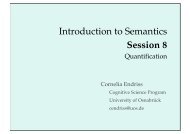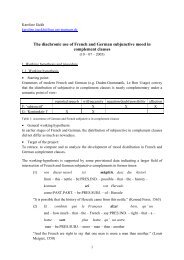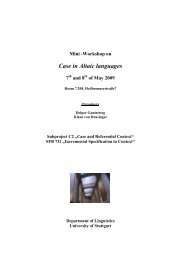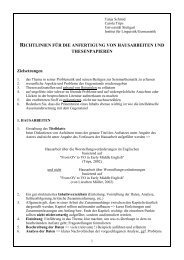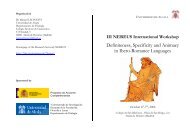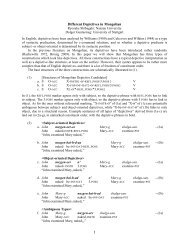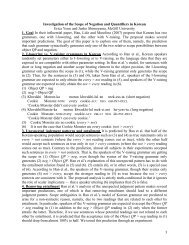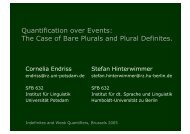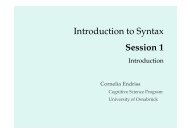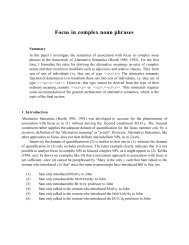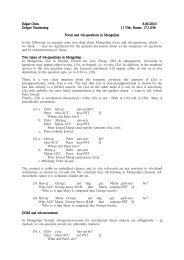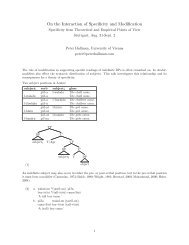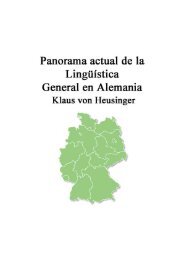SemPrag03.Progr.pdf - Institut für Linguistik/Germanistik - Universität ...
SemPrag03.Progr.pdf - Institut für Linguistik/Germanistik - Universität ...
SemPrag03.Progr.pdf - Institut für Linguistik/Germanistik - Universität ...
Create successful ePaper yourself
Turn your PDF publications into a flip-book with our unique Google optimized e-Paper software.
Scalar Implicature 1<br />
The Time Course of Scalar Implicature<br />
Lewis Bott & Ira A. Noveck<br />
Abstract for the International Workshop "Where Semantics Meets Pragmatics"<br />
Michigan State University, July, 11-13, 2003<br />
In paper presents an experimental investigation into a class of inference known as scalar implicatures. These arise<br />
when a less-than-maximally-informative utterance is taken to imply the denial of the more informative proposition (or<br />
else to imply a lack of knowledge concerning the more informative one). Consider the following dialogues:<br />
1) Peter: Are Cheryl and Tony coming for dinner?<br />
Jill: Cheryl or Tony is coming.<br />
2) John: Did you get to meet all of my friends?<br />
Robyn : Some of them.<br />
In (1), Jill’s statement can be taken to mean that not both Cheryl and Tony are coming for dinner and, in (2),<br />
that Robyn did not meet all of John’s friends. These interpretations are the result of scalar implicatures, which we will<br />
describe in detail below. Before we do so, note that the responses in each case are -- from a strictly logical point of<br />
view -- compatible with the questioner’s stronger expectation; if Jill knows that both Cheryl and Tony are coming, her<br />
reply is still true and if in fact Robyn did meet all of John’s friends, she also spoke truthfully. Or is logically<br />
compatible with and and some is logically compatible with all.<br />
Such inferences were first classified by Paul Grice as generalized implicatures, as he aimed to reconcile<br />
logical terms with their non-logical meanings. Grice, who was especially concerned by propositional connectives,<br />
reflected on those inferences accompanying logical terms that become, through conversational contexts, part of the<br />
speaker’s overall meaning. In one prime example, he described how the disjunction or has a weak sense, which is<br />
compatible with formal logic’s ∨ (the inclusive-or), but as benefiting from a stronger sense (but not both) through<br />
conversational uses (which would make the disjunction exclusive). What the disjunction says, he argued, is compatible<br />
with the weaker sense, but through conversational principles it often means the stronger one. Any modern account of<br />
the way logical terms are understood in context would not be complete without considering these implicatures.<br />
Scalar implicatures have been discussed at length in the linguistic-pragmatic literature as it has greatly<br />
expanded on Grice’s original insights. In what follows, we present descriptions of scalar implicature from the point of<br />
view of two post-Gricean pragmatic theories that aimed to elaborate on Grice but are now in often in conflict. One<br />
approach is often referred to as neo-Gricean (Horn, 1973; Levinson 1983, 2000) and the other is known as Relevance<br />
Theory (Sperber & Wilson, 1985 1996; Carston, 2002). We will discuss each account of scalar implicature in turn<br />
while ultimately focusing on existential quantifiers.<br />
According to neo-Griceans like (Horn, 1973) and Levinson (1983, 2000), the scalars described in (1) and (2)<br />
above are paradigmatic cases of implicature that work on terms that are relatively weak. The speaker’s choice of a<br />
weak term implies the rejection of a stronger term from the same scale. For example, the terms some and all may be<br />
viewed as part of a scale (), where all constitutes the more informative element of the scale (since all p<br />
entails some p). In the event that a speaker chooses to utter some the hearer will take it as suggesting that the speaker<br />
has no evidence that the stronger element in the scale holds (i.e. it is not that case that all holds). Neo-Griceans believe<br />
that the implicature to deny the stronger term in the scale arises automatically as a “default” or “preferred ” meaning.<br />
For example, the default interpretation of some is some but not all. This implicature can be cancelled, but only in<br />
certain contexts subsequent to the production of the scalar. 1<br />
The other account comes from Relevance Theory (Sperber & Wilson, 1985 1996), which assumes that an<br />
utterance can be inferentially enriched in order to better appreciate the speaker’s intention, but this is not done on<br />
specific words as a first step to arrive at a default meaning. According to Relevance Theory, a scalar is but one<br />
example of pragmatic implicatures that arise when a speaker intends and expects a hearer to draw an interpretation of<br />
an utterance that is relevant enough. How far the hearer goes in processing an utterance’s meaning is governed by<br />
principles concerning effect and effort; namely, listeners try to gain as many effects as possible for the least effort.<br />
A non-enriched interpretation of a scalar term (the one that more closely coincides with the word’s meaning)<br />
could very well lead to a satisfying interpretation of this term in an utterance. Consider Some monkeys like bananas.<br />
This utterance with an interpretation of Some that remains in its weaker form (this can be glossed as Some and possibly<br />
all monkeys like bananas) can suffice for the hearer and not require further pragmatic enrichment. In contrast, the<br />
potential to derive a scalar implicature comes into play when an addressee applies relevance more stringently. A scalar<br />
implicature could well be drawn by a hearer in an effort to make an utterance, for example, more informative.<br />
Common implicatures like scalars are implicatures that optionally play a role in such enrichment; they are not<br />
1 Levinson does specify contexts in which the scalar implicature could be, in effect, preempted from occurring.<br />
One example (entailment) is when prior context blocks the scalar implicature because it would be inconsistent.<br />
Consider the following as prior context (from Levinson, 2000, p. 50) : A Saudi Prince has just bought Harrod’s; this<br />
would block the production of a scalar implicature (Some but not all) in Some Saudi princes must be pretty wealthy.<br />
The existentially quantified statements that we will investigate here remain unembedded and thus should not preempt<br />
scalar implicatures according to Levinson.



